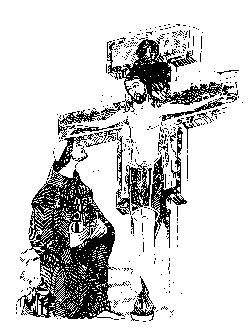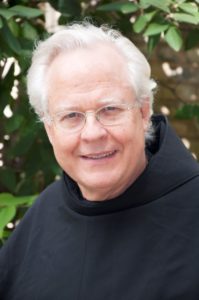
Post-Christian Culture, the Eucharist and Francis of Assisi
Texts: Sir 50: 1, 3-4, 6-7; Gal 6: 14-18; Mt 11: 25-30.
Theme “Behold him whose time the house of God was renovated” (Sir 50).
Subtheme “…a new creation is everything!” (Gal 6: 15).
Subtheme: Jesus exclaimed: “I thank you, Father, Lord of heaven and earth,
because you have hidden these things
from the wise and the intelligent and have revealed them to infants” (Mt 11:25).
Chapter 50 of the Book of Sirach refers to renovating the house of God. Francis of Assisi is the iconic saint of rebuilding the Church. He is known for responding literally to the Most High: “Francis, Rebuild My Church, you see it is falling into ruin.” He seems to have tried to escape what God was asking of him for a short while, then aligned with the message he heard as he was praying before the crucifix. From then on, he chose to conform to the Second Person of the Trinity. He put on a yoke that bound him to Christ as married couples freely choose a yoke binding them in the sacrament of matrimony. [While touring the new home for the priests and brothers of the Congregation of the Holy Cross at Notre Dame, I saw the yoke from the team of oxen that brought Fr. Sorin to Notre Dame in 1842. Who knew that a renowned Catholic university entrusted to Our Lady of Grace would be born?]
In the 1220’s, St. Francis instructed his friars: study without losing the spirit of prayer and devotion. By the 1250’s St. Bonaventure systematized Francis’ guidance. By the early 1300’s, Bl. John Duns Scotus fine-tuned Francis’ instructions. In the 1850’s, St. John Henry Newman amplified the meaning where faith and reason would intersect in response to the “secularizing” called the Enlightenment. By the 1930’s, the secular invasion was being mounted with full vigor. St. Maximilian Kolbe countered the secular invasion with a distinctive Franciscan inflected Marian cast. Pope St. John Paul II gives an unforgettable image to renovate and to build up the Church: “Faith and reason are like two wings on which the human spirit rises to the contemplation of truth. God has placed in the human heart the desire to know the truth—in a word, to know Himself—so that by knowing and loving God, men and women may come to the fulness of truth about themselves” (Fides et Ratio, 1).
The sobering reality is that many external factors react against the human spirit that is free to employ faith and reason rising to contemplate truth. Some say there is a freefall of truth. Yet, God has placed in the human heart as exemplified by all the saints and faithful the desire to know the truth. As a person checks his or her alignment and choices in freedom, they come to the truth about themselves. The journey into wisdom is to come to the fulness of truth about oneself. Yes, our times throw many hindrances in the way. Partial answers are put forth that deceive, that appear as truth. We see in those who align with the traditionalism of the right or modernism of the left, possibly very sincere faithful, but unwittingly allowing a veil to cover clear headed thinking. The result is a serious impairment in knowing and loving God so that they might come to the fulness of truth about themselves.
Francis of Assisi found the balance. He would say: Be Catholic! It took me a long time to understand why Francis was saying: Be Catholic! I concluded that he meant: know your Catholic faith; avoid misinterpretations; guard against them, whether unintentional or worse, intentional. The latter is repackaging doctrine which is very dangerous to faith. First as Anglican and then Catholic, St. John Henry Newman chose the via media. Pope Saint John Paul II chose wisdom as the sure and final goal of all true knowing and to be freed of every hindrance by the intercession of the one who, in giving birth to the Truth and treasuring it in her heart, has shared it forever with all the world” (FR, 108).
Francis became this Marian trajectory underlying Pope John Paul’s Fides et Ratio on every page. Francis became totally devoted to the Mother of God. His writings radiate: “Holy Virgin Mary, among women, there is no one like you born in the world: you are the daughter and the servant of the Most High Supreme King and Father of heaven, you are the mother of our most holy Lord Jesus Christ, you are the spouse of the Holy Spirit” (Off Pass). Francis had become “a [living Pauline inflected] new creation” by seeking perfect conformity to Christ. Franciscans interpret his vocation: “Rebuild My Church” not as a self-aggrandizing egotist, nor as a self-proclaimed savior of the world. Rebuilding the Church with his brothers and devoted faithful is for the long haul. Reform and renewal for the Church are constants. Listen to Francis: “After the Lord gave me brothers, no one showed me what I was to do, but the Most High Himself revealed to me that I should live according to the form of the Holy Gospel.
To live the Gospel is Francis’ uncompromising goal by avoiding extremes of modernism or traditionalism; of being faithful to the Church’s irrevocable and unchangeable doctrine. Francis commanded his friars to work together, to faithfully respect and format Church teaching in a way that demonstrates the friars know how the doctrines match the requirements of our time. To Francis and Anthony, living the Gospel is good theology and does not minimize nor threaten the importance of good theology. To live the Gospel is neither liberal nor conservative as in political, much less traditionalist. To live the Gospel is “liberal” as St. John Henry Newman took the view of a university, a place of teaching universal knowledge, with its object as intellectual, not moral, the diffusion and extension of knowledge rather than the advancement. It is the seat of literature and science. (Preface, Idea of a University).
The vocation of theologian is to serve the truth. The words liberal-conservative as they are used today almost always have a political perspective. While there are similarities and dissimilarities, the categories are not appropriate to clarify matters in theology. In his Testament, Francis understood: “We should honor and respect all theologians and those who minister the most holy divine words as those who minister spirit and life to us (cf. Jn 6:64). Fr. Peter Damian Fehlner, O.F.M.Conv. (1931-2018), understood Francis. There can be tensions when theologians are described as conservative or liberal by our culture in a modern political sense which is not at all helpful. Fr. Fehlner’s adage is: “A good theologian need not be a good politician and a good politician need not be a be a good theologian.”
Many in our post-Christian culture choose something other than the light, a routine that is comfortable, a low ceiling for individual and social behavior. Does repairing and fortifying the house of God in the Book of Sirach serve as a light? The context is fortifying the temple. Possibly. Ours is a developing post-Christian culture. Catholic Christianity plays a part by reacting poorly to external factors. The secular invasion is undeniably visible. When Catholic Christianity temporizes, or delays, post-Christian culture grows. In addition, there is complicity to invite in the secular without the skills and competence to Christianly regulate. This diagnosis of post-Christian culture satisfies and convinces me.
The Eucharist sealed for Francis a reverence in churches and respect for and worthy reception of the Eucharist. Testament: “I would simply pray…We adore You, Lord Jesus Christ, in all Your churches throughout the world, and we bless you, for through your holy cross you have redeemed the world.” Ep Ord: “At the mention of Him who redeemed us and washed us in His most precious blood, you must adore Him with fear and reverence, prostrate on the ground.” Ep Cust II: “I ask you in the sight of the Lord Our God, as much as I can to give the letters which treat of the most holy Body and Blood of the Lord to the bishops and other members of the clergy. Ep Ord: “I admonish and urge that only one Mass according to the rite of the holy Church be celebrated each day where the brothers stay. Our Lord Jesus Christ fills those who are present and absent who are worthy of him.” In sum, Francis models living joyfully because he understood Jesus exclaim: “I thank you, Father, Lord of heaven and earth, because you have hidden these things from the wise and the intelligent and have revealed them to infants.”
In Celebration of My Golden Jubilee Year of Priesthood, Fr. Edward J. Ondrako, O.F.M.Conv.,
eondrako@alumni.nd.edu
Fr. Edward J. Ondrako, OFM Conventual
Research Fellow Pontifical Faculty of St. Bonaventure, Rome
Visiting Scholar, McGrath Institute for Church Life
University of Notre Dame
October 4, 2021
